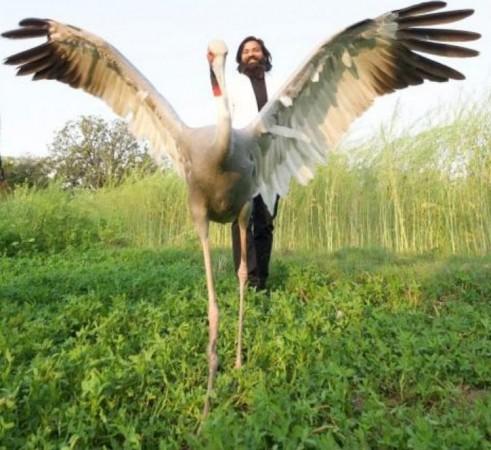In a remarkable turn of events, the Sarus crane, which had resided with Mohammed Arif in Amethi for an extensive period exceeding a year, is presently undergoing an impressive transformation at the esteemed Kanpur Zoo.
Meticulously guided by zoo authorities, this majestic bird is gracefully transitioning from a diet of cooked sustenance to the more natural and fitting regimen of raw nourishment. The Sarus is now undergoing a comprehensive rehabilitation program, purposefully designed to reintegrate it into its natural habitat.
Initially forging an inseparable bond with Arif, who gallantly rescued the endangered creature and nurtured it back to vitality, the Sarus crane captured the attention of the masses with their heartwarming tale.
However, the conservation authorities, recognizing the significance of preserving its species, made the difficult decision to relocate the bird to the zoo, thereby temporarily separating it from its human friend and constant companion for over a year.

Zoo Director Krishna Kumar Singh shared an exciting update on the ongoing rehabilitation efforts for the Sarus crane, emphasizing the gradual transition from its previous diet of cooked food, including items like maggi, daal, rice, and khichdi, to a more appropriate raw diet aligning with the natural feeding habits of wild cranes.
"The Sarus crane is being rehabilitated for the wild by slowly changing its habit of eating cooked food like maggi, daal, rice and khichdi to eating a raw diet that is more suitable for wild birds like cranes," he said.
Team's dedicated care revives diet habits
With meticulous care and dedication, the team has achieved an impressive 80 percent success rate in guiding the crane towards adopting a suitable diet. The revised menu now includes raw grains, insects, crustaceans, spinach, and water hyacinth, offering a nutritious and balanced selection for the crane's evolving needs.
Since its arrival on March 25, the Sarus crane has found solace within a spacious enclosure measuring 40 x 25 feet. In an effort to minimize human interaction, the crane has been isolated from direct contact with people, while live feeds have been set up to transmit captivating images of the bird's activities to the office of the esteemed zoo director.
Mohd Arif rescued a Sarus crane in Amethi Uttar Pradesh. Now the saras follows him everywhere he goes.
— Ahmed Khabeer احمد خبیر (@AhmedKhabeer_) February 24, 2023
pic.twitter.com/V9YIweJSEh
Given the Sarus crane's extended period of companionship with Arif spanning a year, it is understandable that additional time will be required for officials to successfully rehabilitate the bird into its natural forest habitat. "Once the bird recovers completely, it will be sent back to its true home of the wilderness," said Singh.
Sarus crane prefers human companionship
Notably, the crane continues to display a preference for human companionship and the unique experience of being hand-fed. During its time alongside the dedicated Amethi farmer, the crane formed an extraordinary bond with Arif, accompanying him to the fields as shown in the video above that went viral last year and being embraced as an honorary member of the family.
Last month, a heartwarming reunion between Arif and the crane took place at Kanpur Zoo, capturing the attention of social media users as the touching video spread rapidly.
Arif has fervently expressed his desire to retain custody of the bird, imploring officials to grant his request. However, despite his plea, the request has been turned down by the authorities.








